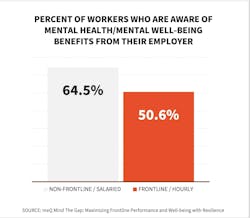Over the past few years many companies have worked hard to identify and provide assistance to employees on the issue of mental health.
That's the first step. But the second part is for employees to speak up about having an issue.
That is a harder than it would seem as evidenced by a a recent meQuilibrium (meQ) study of frontline worker mental well-being which found that frontline workers are more likely to say they do not have a problem.
The study of 1,183 US-based workers, reported that frontline workers are 64% more likely than non-frontline peers to state that they do not have an issue with stress.
Among those who recognize they have a problem, frontline employees are 62% more likely than non-frontline staff to say they have not sought help.
The study of 1,183 US-based workers revealed that rates of anxiety and depression among frontline workers are 33% and 61% higher, respectively, and when facing high stress, they are 30% less likely to seek out professional assistance, compared to their non-frontline counterparts.
"Frontline workers regularly interact with frustrated customers, work irregular shifts, lack paid time off, and have minimal autonomy over duties assigned by managers, which can contribute to higher rates of burnout, anxiety, depression, and secondary traumatic stress, compared to their corporate colleagues," said Brad Smith, Ph.D., Chief Science Officer at meQ, in a statement. "Unfortunately, frontline workers are often unaware of their well-being options and their irregular hours can impede appointment scheduling, resulting in a gap between their needs and use of relevant benefits."
Even though frontline workers are less aware of mental well-being benefits, meQ's workforce well-being research shows that frontline populations demonstrate significantly larger improvements in resilience–the skill that protects workers from burnout risk – than non-frontline populations.
A study that was pulled from meQ data warehouse, included a sample of more than 18,000 employees across the two populations, these data show that frontline staff have a 42% greater improvement in resilience than non-frontline populations.
Gap in Benefit Offerings
meQ's research confirms a significant knowledge gap between frontline and non-frontline employees regarding employer well-being benefit offerings. Awareness of relevant employer-provided benefits was 22% lower among frontline staff compared to non-frontline staff. This gap was most pronounced among younger employees where research suggests the need is highest. Three-quarters (73%) of non-frontline Gen Z staff report feeling well-informed about available mental well-being benefits and less than half (43%) of frontline workers is aware of relevant benefits.
"Given both the elevated risk factors and participation obstacles frontline employees face, organizations reliant on these essential workers must prioritize awareness and access to needed benefits across this vulnerable population," explains Dr. Smith. "Using mental well-being benefits to seek professional help should not be a move of last resort only associated with times of crisis. Unfortunately, the first line response to troublesome levels of stress, anxiety or burnout among frontline workers is to take time off from the job – which they do only reluctantly as it represents a decrease in pay."
"It's clear that frontline workers shoulder greater burdens from highly demanding roles yet are less likely to seek support," said Dr. Smith. "Employers relying on these essential employees have a vested interest in closing this gap through proactive outreach and education to improve benefit awareness and utilization around mental well-being. Given the powerful connection between mental well-being and performance, closing this knowledge gap can lead to a healthier, more productive workforce, especially among frontline workers across industries like transportation, healthcare, manufacturing, and hospitality."

